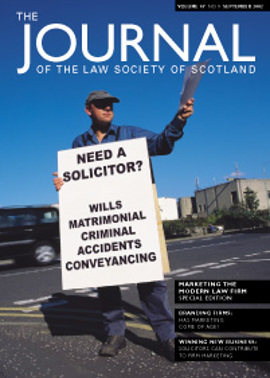Marketing through the ages
They are mistaken. Indeed, most of them have been marketing all of their legal lives, selling themselves to their clients, lunching important clients and providing services at prices their clients believed to be reasonable.
One of this breed told me that his clients would be offended if he were to ask them what they thought of his services. Really? What strange clients he must have. Everyone likes to be asked their opinion. Perhaps he was afraid that he would not like the answers.
But he shouldn’t be afraid. Firstly, the answers are likely to be positive. And, secondly, if there are criticisms to be made, wouldn’t he rather know what his clients really think? They are going to think it anyway. And self-knowledge is at the heart of your marketing efforts.
In the beginning….
Marketing of the “lunch and golf” variety was being carried out long before the Law Society finally agreed to allow advertising. And that form of marketing remains one of the best there is. It is part of the glue which holds the client to you.
The larger firms, of course, have taken other forms of marketing to their hearts – although not always to their heads. How else can you explain the advertisements in Business Insider, the Chartered Accountants’ magazine, and the other unread glossies which slump onto our desks every month?
Some have gone for the better option of writing articles for the business pages of the Scotsman and the Herald; an intelligent article says far more about your firm than an unintelligent advertisement.
The larger firms have also taken to their hearts the first question of marketing – just what exactly are we selling here? In many cases, this has led them to drop some of their services, such as Private Client services, completely. This is not to suggest that these services aren’t profitable; Turcan Connell are thriving proof that they are. However, specialisation of this kind allows them to concentrate their marketing efforts on particular target markets.
Sticking to the knitting
At the root of every good marketing campaign is a clear understanding of what we are selling and how good we are at providing the service. If we are not very good at litigation, it is wasteful to market the litigation service. All we will do is create a supply of unhappy clients, who will be prepared to cheer themselves up by telling others about the source of their unhappiness.
And you cannot be really good at something unless you are prepared to specialise in it, at least to some extent. I am not suggesting that we should all specialise in one single service, although some solicitors do just that. My own firm has specialised for years in buying and selling houses, as do many other firms in Edinburgh.
Others specialise in criminal law, or even the facets of criminal work (trials or preliminary work for instance). And there are enough “Business Law” firms around now for this specialisation no longer to be a rarity.
But, marketing is more effective if you are prepared to specialise and concentrate your efforts on a particular service. And this is especially true on the Internet, where many firms are now concentrating their marketing efforts. I especially admire the websites of Golds (www.golds.co.uk), and @home (www.smiths-athome.com), although there are many other firms dong good things out there on the ether.
However, the firms which are not specialising clearly find it difficult to focus their websites on specific services. This results in a multitude of rather anonymous brochure-style websites, which is not what the solicitor-hunter is looking for.
Outwith the Web
Which brings me back to the firms who have decided not to market themselves. They probably won’t have websites, and will accordingly be missing out on a certain amount of business, as more and more clients beginning their search for advice on the Internet. They will also look dowdier and dowdier, as the opposition preens its new finery and smartens up its services to attract the wandering client.
They may be marketing their services in a different way, of course, and there are some interesting examples out there, such as the financial advice firm recently established by a group of Edinburgh solicitors.
However, they are more likely to be sending out wrong messages by not answering their telephones quickly, maintaining scruffy reception areas and, above all, failing to communicate well with their clients. Good marketing is basic, and there is not much point in dealing with the fancy-dan stuff until you have got the basics right.
Brian Allingham is the Founding Partner of Allingham & Co, a management counsultant to small and medium-sized law firms, and a regular writer and lecturer on management matters. He has an MBA in legal practice and has recently completed a Certificate in E-Business at the Robert Gordon University virtual campus.
In this issue
- Marketing through the ages
- Making the most of marketing
- Firms embrace merits of marketing
- Marketing methods for smaller firms
- Investing in people brings rewards
- Time to learn from enlightened English courts?
- Distinction between threatened and completed wrong
- Make it policy to know about policy cover
- In practice
- Plain speaking
- Book reviews






